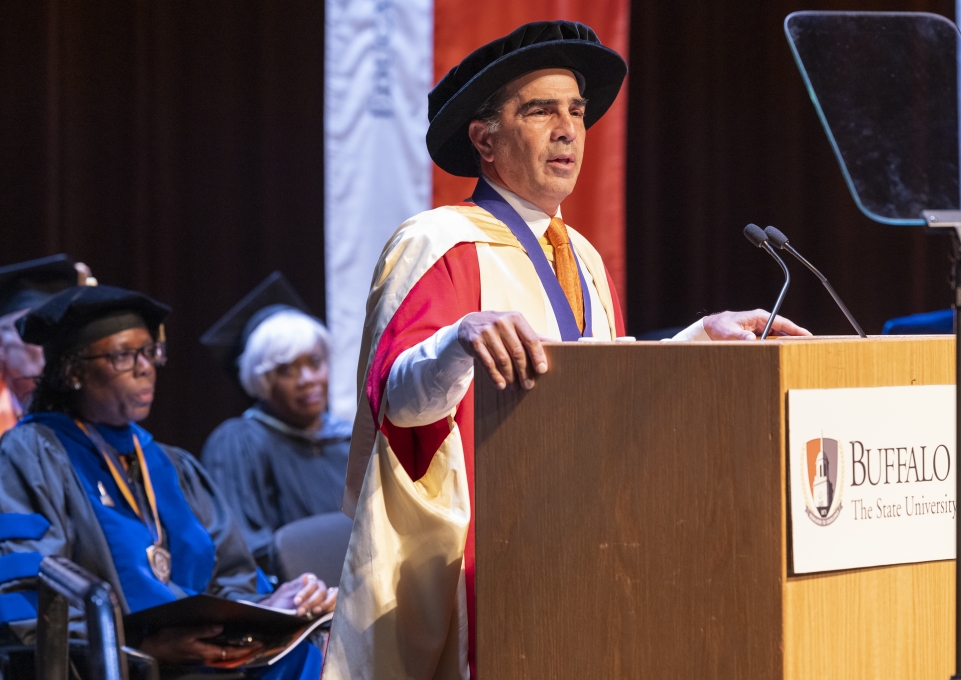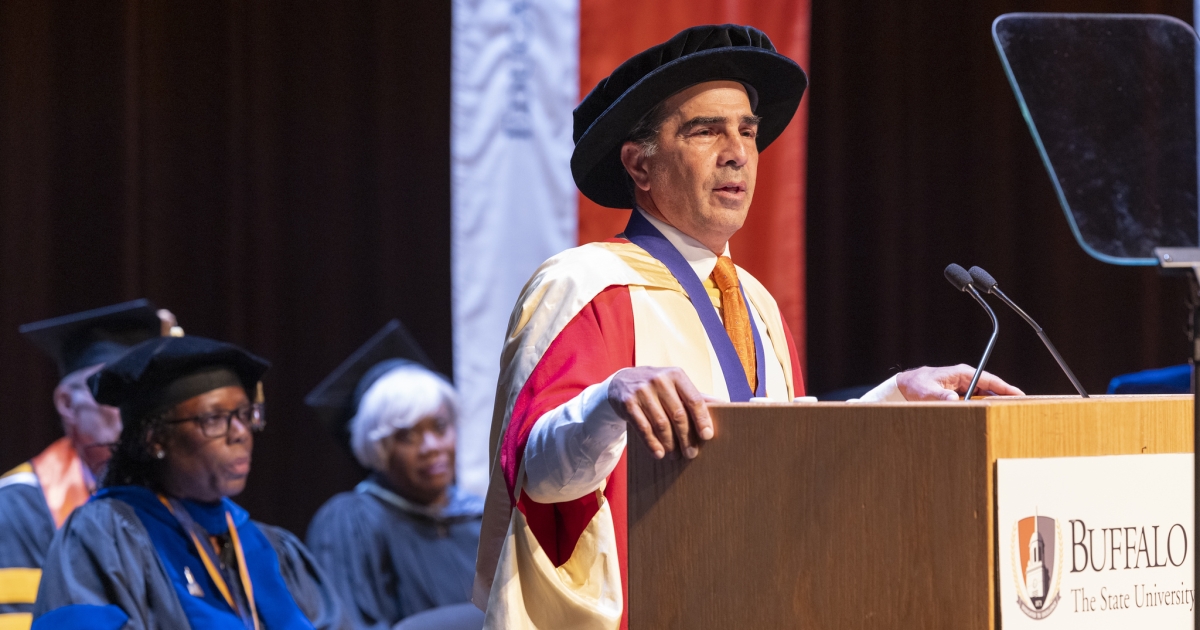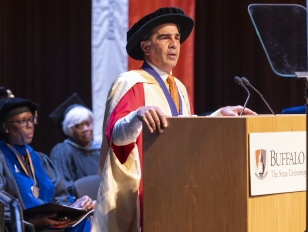
Gerard J. Puccio, Ph.D., SUNY distinguished professor of creativity and change leadership, presented the Convocation Address at Academic Convocation, a tradition that recognizes select faculty and staff members with President’s and Chancellor’s Awards for Excellence for their extraordinary efforts on behalf of the university, recognizes significant awards and major grants of faculty and staff members, and welcomes all new employees to campus. Interim President Bonita R. Durand, Ph.D., offered congratulatory remarks.
Puccio addressed a full auditorium in the Performing Arts Center at Rockwell Hall during the ceremony on Thursday, September 19. He invited attendees to partake in a simple demonstration that illuminated how humans feel about change.
“Change requires effort and energy,” Puccio said. “When we do something novel, when we create, we bring something new into being, we introduce change. And novelty is a fundamental human need. Novelty is stimulating. New experiences make us feel alive. And when we apply our imaginations to create something new or to solve a problem in an original way, we live our most rich lives as we are truly maximizing our potential—we are learning and growing.”
Following is the full text of Puccio’s speech:
This is my thirty-fourth year at Buffalo State.
In that time, I have attended a number of Academic Convocations.
In all cases, I have been a member of the audience. Today, it is my honor to be a speaker.
It is my great hope that I might share some words that accentuate the pomp of this special gathering.
I love my work as an academic. And I love the start to a new academic year.
Embedded in this moment are a pair of conflicting feelings, perhaps better described as a duality or polarity, as they are inextricably linked together.
On one hand there is the sense of familiarity.
This familiarity is likely to conjure a sense of comfort, a quiet knowing of what is expected.
Yet, on the other hand, there is a sense of possibility that comes along with a new beginning, an awareness of the potential to grow in new and interesting ways.
This polarity is fundamental to the human experience.
In fact, I would argue it is the very essence.
Allow me to use some labels for these opposing and interdependent qualities.
One I will refer to as conformity, the other I will refer to as creativity.
We are all born with twin innate tendencies, one to conform and one to create.
Together they lead to growth, adaptation, and, ultimately, they ensure our survival. I would argue it is the productive interplay of these two predispositions that is our species competitive advantage.
Let me demonstrate by way of experience.
This is the audience participation element of my speech.
Please fold your arms in front of you, as you would naturally. Keep them that way until I tell you otherwise.
Now, let’s pause for a moment and reflect on this.
If I asked you to describe how this feels, you would likely say… natural… comfortable… normal. And if I asked you to describe how much energy it took for you to fold your arms, likely you would say very little.
In fact, you are likely to say that you hardly gave it much thought at all.
Okay, you can relax.
From this brief experience, we can extract the benefits of conformity. When we adhere to an established pattern, we save energy.
We can be efficient, things are predictable… we know what to do and how to act. We can anticipate with confidence. There is a great comfort to this.
In fact, you could describe this as our comfort zone.
When our conformity tendencies are shared with others, we create norms, procedures, rituals… all of which promote collaboration and cooperation.
I have a habit of driving on the right side of the road, and, when others conform to this practice, things go smoothly.
Conformity is not a bad thing, until we are required to change. As when I moved to England for my doctoral studies, then driving on the right side of the road was problematic.
I needed to change to something that was novel for me—driving on the left side of the road.
Let’s have a direct experience with change.
I would like you to fold your arms again, but this time put the opposite arm on top. I can see some of you are struggling and look confused.
As before, leave your arms woven together in the opposite manner. And let’s zero in on how you might be feeling right now. You might say this feels uncomfortable, awkward. It likely took a bit more thought and energy to figure out how to fold your arms.
This is precisely how change feels. And precisely the reason why we resist change. Change requires effort and energy.
When we do something novel, when we create, we bring something new into being, we introduce change. And novelty is a fundamental human need. Novelty is stimulating. New experiences make us feel alive.
And when we apply our imaginations to create something new or to solve a problem in an original way, we live our most rich lives as we are truly maximizing our potential—we are learning and growing.
While our survival requires our twin powers of conformity and creativity to coexist, there are times when inertia sets in. That is our desire to conserve energy and preserve our sense of security can facilitate a preoccupation with maintaining the status quo.
In an ever changing world—precisely the world we live and work in today—conformity without creativity, in other words, strictly staying in our comfort zone, leads to extinction.
In Roman mythology, the god Janus is known as the god of beginnings and ends… entrances and exits… change and transition… gateways, passageways, and doorways. The month of January gets its name from Janus.
In my field of study, creativity, we have a concept known as Janusian thinking, which is the kind of cognitive flexibility that facilitates an ability to embrace two opposites, or, to see in multiple directions at the same time.
As we stand on the threshold of a new academic year…
For your growth…
For our growth as a community…
I encourage you to think about how you might adopt a Janusian attitude. A mindset that blends conformity with creativity… in which you continue to use the most productive aspects of the past… while remaining open new things to come.
As human evolution has shown us, it is the balance between conformity and creativity that enables us to thrive. May you find that balance.
Thank you.
Video by John Myers, Buffalo State Marketing & Communications.
Photos by Jesse Steffan-Colucci, Buffalo State photographer.



